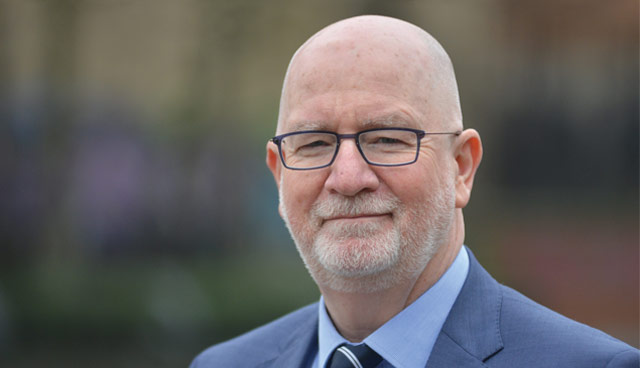Rewarding and challenging term comes to a close


Set to complete his seven-year term in June this year, agendaNi talks to Police Ombudsman Michael Maguire about reform of the office, public perception and dealing with Northern Ireland’s past.
In 2011 a highly critical report by the Criminal Justice Inspection Northern Ireland (CJI) concluded that the “operational independence” of the Police Ombudsman’s office in relation to its conduct investigating historical cases had been lowered. The CJI report was one of three consecutive, critical reports to be published around the time, including a review by former senior civil servant Tony McCusker highlighting political interference on the office’s work and a report by the Committee on the Administration of Justice which questioned the office’s independence from the police and the Northern Ireland Office.
The Chief Inspector of the CJI at the time was Michael Maguire, who, just a year later, would be appointed as the new Police Ombudsman for Northern Ireland. Undoubtedly, Maguire has spearheaded change within the office which he once recommended should suspend historical investigations.
With his seven year term set to conclude in July, Maguire offers a review of his time: “I think the office is in a very different place than where it was seven years ago,” he states. “There was a whole suite of issues that needed to be addressed such as governance within the office, the relationship between the office and the police, the relationship between the office and the Department of Justice, between the office and families and those who brings complaints to the office. I think if you look back on each of these issues and where we are now, the office is in a much stronger place.”
Maguire outlines that in order to progress the office had to reflect on its role and its reason for being, which he states is to “provide independent, impartial and robust investigation” into complaints against the police.
He suggests that the office has “recalibrated” its position as a conduit between the citizen and the police, adding: “I take the view that the police in Northern Ireland, or any police force for that matter, have incredible powers. For example, the power to arrest, to search your home or to take life in some instances. For an individual to face up to what is an immense organisation is incredibly difficult.”
In recalibrating, the office has also made a number of other significant shifts, such as a more robust approach to the publication of findings. Over the year to March 2018 the office received 2,561 complaints, resulting from 4,241 allegations made against police. Of the 887 cases subject to full investigation, the office substantiated all or some of the investigations in 24 per cent of the cases and a total of 197 recommendations were made for disciplinary action or performance improvement. The office also made 40 policy recommendations designed to improve policing.
“There is much greater activity on our part to publish the work that we do,” he explains. “That deliberate action has served two functions. Firstly, it has been educative in allowing people to see what they can make a complaint about and secondly, it’s a demonstration that the oversight mechanism is working. I have always taken the view that a report that states the police have done no wrong is as important as one which criticises the police.
“The publishing of reports is important to demonstrate not only that we are here but that we are visible to people and they can see the work we are doing on a day to day basis.”
Improved engagement has been another change undergone during Maguire’s term. As well as the 45 press releases issued over the year to March 2018, the Police Ombudsman has also taken stands at Belfast Pride and Mela, developed an app to inform young people about the role of the office, increased outreach in schools and the Ombudsman has been involved in a series of high profile speaking engagements. However, probably the most significant element of engagement improvement for the office, especially to harder to reach groups, has been through social media. The office continues to have over 25,000 users of Facebook and 96,500 tweet impressions on Twitter.
“Cases are becoming more complex and yet the funding we have to deal with these cases has decreased. It is something that we need to be very diligent about and I have not been behind the door in the past calling for additional funding where it is necessary and appropriate to do so.”
“The power of social media is immense,” states Maguire. “For example, during the year we launched a video on Facebook aimed particularly at young people, telling them of their rights and responsibilities if they are ever stopped and searched by police. The video attracted more than 90,000 views. We’ve been able to utilise social media in its best function, as a communication tool.”
Resources
The Police Ombudsman for Northern Ireland is unique in that it deals with all complaints against the police, including criminality and misconduct of police officers, while also having the powers to call itself into investigations, where necessary.
The core business of the office is the receipt and investigation of complaints and referrals that relate to contemporary policing in Northern Ireland. In addition, the office continues to investigate historical matters that are considered by the Ombudsman to meet the statutory test for investigation.
Maguire assesses that like many public bodies, the office has been the subject of cuts in recent years. Talking specifically about the levels of resources available to deal with contemporary cases, he emphasises: “There will come a point in time when we cannot continue [to meet demand] and where it begins to impact on the nature of the work that we do.”
Outlining a trend of a growing complexity of issues within cases, underpinned by things like social media and the treatment of vulnerable people, he adds: “Cases are becoming more complex and yet the funding we have to deal with these cases has decreased. It is something that we need to be very diligent about and I have not been behind the door in the past calling for additional funding where it is necessary and appropriate to do so.”
Quizzed on the likely impact of reduced resources, the Police Ombudsman states: “Where it has an impact is on the length of time it takes to do the work. We have had to prioritise cases. Cases that are important to the individual but that don’t raise issues of criminality or substantive misconduct tend not to be dealt with as quickly.
“That has an impact on our customer service because those cases constitute a large volume of complaints coming to the office. If we’re unable to process those complaints quickly then that will change people’s perception of the office.”
Turning to the office’s work on legacy cases, the Ombudsman has been vocal on what he assesses to be “chronic underfunding” in dealing with legacy issues, which he agrees is the most “controversial area” in which the office is involved.
“When I came into the office we had in the region of 170 complaints and around 40 staff. Today we have in excess of 420 complaints and just less than 30 staff,” he states. Adding: “While we can assess that it is a sign of the growing confidence in the office that more people are bringing complaints to us, our budget of around £2 million a year means that the work we need to do is grossly underfunded.”
Suggesting an imbalance in relation to the funding, Maguire makes the comparison between his budget and the estimated £50 million allocated to Operation Kenova, the independent investigation into British agent Stakeknife being led by Bedfordshire Police Chief Constable Jon Boutcher, and outlines his belief that Northern Ireland needs a better way of dealing with the past.
“The way in which Northern Ireland deals with its troubled past is simply not working. It’s underfunded, it’s uncoordinated, it’s dysfunctional and it’s subject to ongoing controversy. I have been a huge supporter of the proposals to establish the Historical Inquiries Unit (HIU), subject to some changes which I feel are important. The principle behind the unit, which takes legacy from us and the PSNI and puts it into a single unit to deal with those issues, is the way to do that.”
“The way in which Northern Ireland deals with its troubled past is simply not working. It’s underfunded, it’s uncoordinated, it’s dysfunctional and it’s subject to ongoing controversy.”
Discussing proposals within the consultation paper ‘Addressing the legacy of Northern Ireland’s past’ launched by the Northern Ireland Office, which suggests a role for the Ombudsman in investigating complaints against HIU officers, he says: “What would be against the spirit of what we are trying to achieve would be for the office to get drawn back into legacy issues by having to re-look at investigations within the HIU which people are unhappy with. I think we need to think carefully through what that would mean. It is one option within the NIO paper and I think there are other options that need to be considered.”
Maguire emphasises that if political consensus is not reached on establishing a HIU then the Ombudsman’s office needs to be appropriately funded to carry out its work.
Perception
Greater awareness of the Ombudsman’s work, especially around legacy cases, has also led to greater levels of public and political scrutiny. Maguire maintains that significantly improved awareness (86 per cent public awareness of the office in 2017/18) and confidence (76 per cent confidence that the Police Ombudsman for Northern Ireland deals with complaints in an impartial way in 2017/18) figures, over his seven-year term, highlight this. However, he is aware that individual reports can spark controversy or render some people unhappy.
He says: “It is not the role of the office to make people happy, whether that is the police, families or victims. Our job is to undertake an independent and impartial investigation. For me, it’s the nature and quality of the investigation that we need to focus on.”
Equally, he recognises that political scrutiny is usually centred on issues of legacy. “My view to a politician is very much if you don’t like it, then change it. We are doing the job that we were set up to do. Ultimately, if politicians don’t like that then they have the power to change it. However, until that happens the office will continue to carry out its function and seek the funding required to do our job properly.”
One area in particular where Maguire has attracted scrutiny is in relation to his involvement in the ‘No Stone Unturned’ documentary, which looks at the 1994 Loughinisland massacre for which no one has ever been charged. In 2016, the Police Ombudsman ruled there had been collusion between some police officers and the gunmen and has had to defend his findings against legal challenges.
Maguire agreed to be interviewed for the documentary, which contained information previously protected from the public and was criticised by some for doing so. In response, he highlights that when engaging with the documentary team, his decision to do so was in the context of him engaging with such teams since taking up the role.
He says: “It is part of the publication of the work of the office to engage in this way and allows us to articulate the work that we are doing. I wanted to ensure that the work of the office was fairly represented, which it was. How that impacts on other people’s perceptions is really for them.”
Future
Turning to the future, Maguire is hesitant to “set the agenda” or “mark the homework” of his incoming successor. Recognising that it will be for them to determine a future pathway, he stresses the importance of the office in providing “independent, fair and robust investigation” into complaints made against the police. “That will continue and any ombudsman will see that as the core of what they do,” he says.
Describing his term as a “unique experience” and a fascinating seven years, he concludes: “I take a great deal of satisfaction in the fact that the office is in a stronger place than when I took over. It’s an experience that has been tremendously rewarding, as well as challenging over that time and I don’t think there is anything that I have done prior to coming to the office, or anything I will do afterwards which will replicate what it has been like.”
Michael Maguire’s term ends in July 2019 and the closing date for applications to succeed him closed in December 2018.





